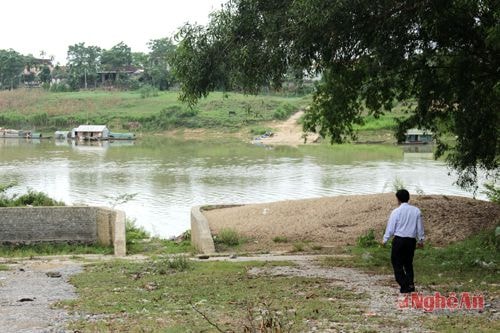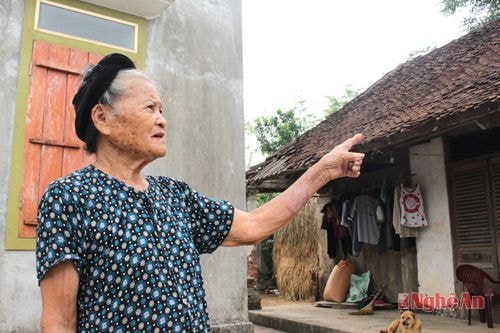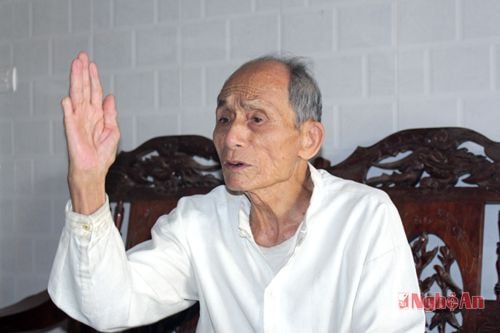Land with three river sides
(Baonghean) - That land has rivers on three sides. The Lam River flowing through Bara Do Luong forms an “s” and Luu Son commune is located at the starting point. That picturesque countryside during the years of resistance against American imperialism was devastated by 7,600 bombs of various types with an estimated weight of nearly 2,300 tons. Now life has returned to green even though there are still villages that celebrate the death anniversary of their loved ones on the same day.
Tran Phu hamlet is located on a low hill called Ru Nay or Ho Tieu Tam Dinh. That's why the hamlet was also known as Luu Tieu in the past. We visited the house of Mrs. Tran Thi Thi in Tran Phu hamlet at noon on a day in July. She is 86 years old this year but she is still very lucid. When asked about her family, she counted on her fingers, her smile exuding the scent of betel: "I have 9 children, 17 grandchildren, 11 great-grandchildren. You see, the house is always bustling..." A moment later, she fell silent, wiped her tears: "9 children but lost 3. I know the love". The day of June 20, 1965 became a pain, a haunting obsession that haunted the mother's entire life who lost 3 children at the same time.
 |
| The old Dien Tien ferry (Luu Son) was one of the bombing sites of the US Air Force. |
That day was also a summer day, the weather was gloomy and hot. Everyone in the village went to the fields, some helped the main army units stationed in the commune. In the middle of the morning, suddenly a group of planes tore through the air. A series of bombs fell on the small village of Luu Tieu. The tiled roofs, the roofs, the bamboo banks were burning fiercely. When people arrived, almost the entire village had been plowed up and destroyed by bombs. No one recognized their own houses. Dozens of people collapsed because of what they saw. Mrs. Tran Thi Thi choked up, not wanting to recall that painful moment. She only knew that in the blink of an eye, her family lost 4 people, that was her father-in-law and 3 children, 2 girls, 1 boy. Everyone knows that war is painful, is loss. But its brutality is beyond the most horrifying human imagination. 21 people, including children and the elderly, were killed by the bomb, a painful truth. The whole village was immersed in an atmosphere of mourning and death. Mrs. Tran Thi Thi wiped away her tears and muttered: "Mrs. Phuong's family lost 3 grandparents, Mrs. Hoa Loc's family lost a daughter, Mr. Thi also lost his grandmother..."
 |
| Mrs. Tran Thi Thi introduces her family's house which was rebuilt after the bombing on June 20, 1965. |
Also on that gloomy summer day in Luu Tieu village, old lady Le Thi Bon was heartbroken because she lost two children, her son Bui Huu Tien and daughter Bui Thi Tu. Right after that tragic event, Mrs. Bon's other children joined the army, went to the front line, and all aimed to contribute to reclaiming justice and preserving peace for the village. But then Mrs. Bon's two sons remained forever on the battlefield. They were martyrs Bui Huu Thi and Bui Huu Ky, who sacrificed their lives in 1970 and 1971, respectively, on the southern battlefield. Even though in 2014, Mrs. Le Thi Bon was awarded the title of Vietnamese Heroic Mother by the Party and State, perhaps nothing can fill the pain of mothers who lost their children. And in Tran Phu hamlet, the 20th of the 5th lunar month every year becomes the common death anniversary for dozens of souls.
Why did that small piece of land suffer so much pain and loss? Mr. Tran Dinh Lam - Chairman of the People's Committee of Luu Son Commune (Do Luong) said that during the years of resistance, Luu Son was located in a strategic area. To the north of the commune is the Bara Do Luong irrigation project, providing water for production in the Yen - Dien - Quynh region (Yen Thanh, Dien Chau, Quynh Luu). Luu Son Commune is also an area with Highway 7A running through it, which is the mid-point, a springboard for supplying and transporting human and material resources for the Southern Laos front. In addition, in Luu Son, there are also two ferry terminals, Dien Tien and Luu My, at the beginning and end of the commune, taking turns transporting weapons, ammunition, and necessities across the river to the battlefield. In addition, on this piece of land of about 4km2, there is also a military food warehouse, along with a system of river transport ships serving the front line...
Since August 5, 1964, after fabricating the "Gulf of Tonkin incident", the US imperialists have frantically escalated their bombardment of the North of our country. Spread over the key area of Truong Bon and the vital traffic route 15A connecting to National Highway 7A, Luu Son has become a "bomb bag" and shared the fire with the whole country. Here, many main units were stationed, directly fighting the imperial air force. That was the anti-aircraft artillery position deployed in the middle of the field of Dien Bien hamlet, also known as Dong Tu position; the missile position stationed next to the food warehouse; the radar unit stationed in Phu Tho village; the anti-aircraft artillery unit protecting the Bara dam irrigation project...
Because they recognized the dangerous terrain, the enemy frequently bombed this land. The history of Luu Son commune also recorded: "At 12:30 on March 19, 1965, many groups of American planes swooped down and dropped bombs on the food warehouse of Soi market, burning down over 100 houses of the people of Quang Trung village, Dien Hong, the state warehouse collapsed, and food was burned. For 10 consecutive days, people took turns transporting thousands of tons of food." "On September 12, 1966, the enemy bombed the artillery position, threatening to destroy the 100mm ammunition depot. Although American planes were still roaring, the militia arrived in time and safely evacuated the ammunition depot."
“At 1 p.m. on June 16, 1968, enemy aircraft fiercely attacked the Dong Tu anti-aircraft artillery position, the bunker of the 2nd Company - 222nd Regiment Command, and buried two 100mm cannons and a monitoring device. Under the bombs of American aircraft, the Luu Son militia calmly treated and transported dozens of wounded soldiers to safety. At the same time, they organized the burial of 19 heroic martyrs who died”. “On November 14, 1968 alone, the enemy attacked Luu Son commune 9 times with all kinds of bombs such as magnetic bombs, cluster bombs, anti-personnel bombs... killing 39 innocent people and injuring 65 others. Also on this day, five young girls were killed by enemy bombs while they were planting rice and serving in combat...”.
 |
| Mr. Tran Dinh Quy, former captain of Luu Son Commune, tells about the days of bombs and bullets. |
Up to now, Mr. Tran Dinh Quy, in Dien Bien hamlet, former commune team leader of Luu Son from 1966 to 1969, cannot remember how many times the people of the commune participated in supporting the army to fight the enemy. "No one evacuated. Everyone stayed to produce, raise livestock and serve the resistance war" - Mr. Quy said. Then he also said that the Vietnamese Army was the army of the people, it was a close relationship. At that time, the army was protected and cared for by the people, every family had soldiers living in their house. Villages, hamlets, fields all became battlefields, bullets, bombs, death lurked day and night, but the army and people worked together, were not afraid, not discouraged.
Mr. Tran Dinh Quy still remembers the bombing right in the middle of the Dong Tu battlefield, the whole battlefield was almost buried, there were soldiers whose bodies were on fire, despite the planes hovering, the bombs exploding and shaking the earth, hundreds of militiamen and local people rushed out to dig through the mud to save soldiers, move the artillery. "That time, the people saved 34 soldiers. It was very hard, but tears of joy" - Mr. Quy recalled.
During the 8 years of fighting against the escalating campaign of the US Air Force, Luu Son land had to bear the brunt of nearly 2,300 tons of bombs with 7,600 bombs of all kinds. Bombs and bullets killed 85 innocent people, injured nearly 150 others. 362 houses were destroyed, nearly 170 buffaloes and cows were killed. In the whole Luu Son commune, there was no intact village, many cultural works were damaged. The commune also had 192 martyrs, 29 wounded soldiers and 31 sick soldiers who devoted their lives to the independence and freedom of the country. In 1995, Luu Son commune was awarded the title of Hero of the People's Armed Forces by the Party and State to remember and honor the feats of the people and this land in the sacred resistance war of the nation.
As a land of historical rendezvous, Thanh Luu land in the past and Luu Son today are continuing to write successes on a new journey. With a population of 6,500 people, the poverty rate of Luu Son is now only 1.62%, down nearly 3% compared to 2014; fairly rich households account for 50%. Luu Son is a typical example of the province in winter vegetable production with a value of 70 - 80 million VND/ha. Implementing the National Target Program on New Rural Construction, up to now, Luu Son has achieved 16/19 criteria and is striving to become one of the 4 communes of Do Luong district to reach the finish line this year.
I remember my mother once said: “You have to go far away, our homeland has so many stories. Our country is not like that”. My mother is no longer here, she left and carried with her the burden of life, carrying with her the wound across her hip from the bombs of war. When I remember my mother, I often think of the image of a barefoot nurse, carrying a first aid kit on her shoulder, running precariously between the artillery positions, on the fields that had been carved into deep holes by bombs. On that piece of land surrounded by rivers on three sides, the green was endless.
Dao Tuan






